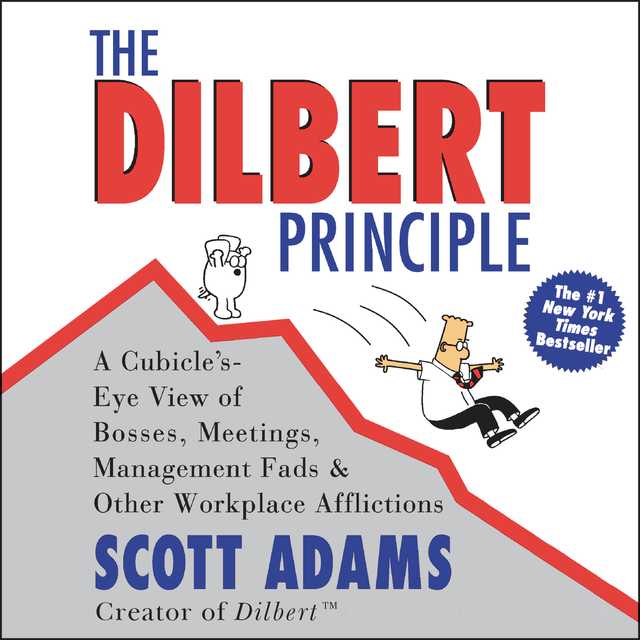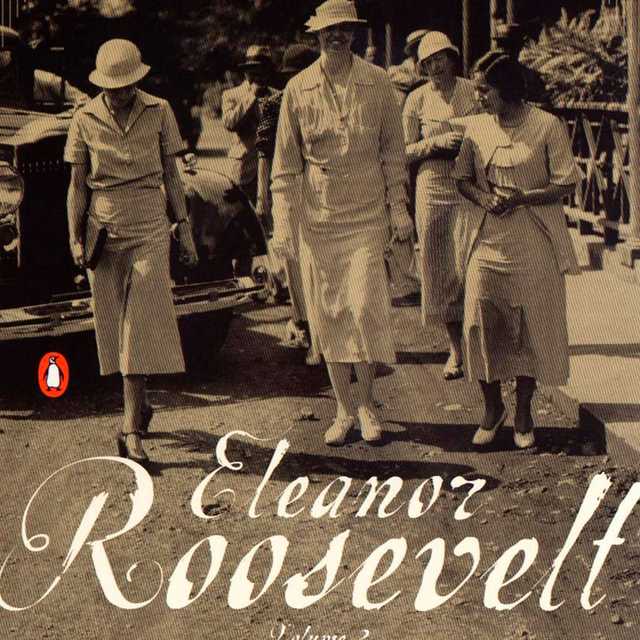The Dilbert Principle Audiobook Summary
The creator of Dilbert, the fastest-growing comic strip in the nation, takes a look at corporate America in all its glorious lunacy.These hilarious essays on incompetent bosses, rampant management fads, bewildering technological changes, and so much more, will make anyone who has ever worked in an office laugh out loud in recognition.
The Dilbert Principle: The most ineffective workers will be systematically moved to the place where they can do the least damage — management.
Since 1989, Scott Adams has been illustrating this principle each day, lampooning the corporate world through Dilbert, his enormously popular comic strip. In Dilbert, the potato-shaped, abuse-absorbing hero of the strip, Adams has given voice to the millions of Americans buffeted by the many adversities of the work place.
Now he takes the next step, attacking corporate culture head-on in this light-hearted series of essays. Adams explores the zeitgeist of ever-changing management trends, overbearing egos, management incompetence, bottomless bureaucracies, petrifying performance reviews, three-hour meetings, the confusion of the information super highway, and more.
With sharp eyes, and an even sharper wit, Adams exposes, and skewers, the bizarre absurdities of everyday corporate life. The Dilbert Principle rings so true! Listeners will be convinced that he has been spying on their bosses.
Other Top Audiobooks
The Dilbert Principle Audiobook Narrator
Scott Adams is the narrator of The Dilbert Principle audiobook that was written by Scott Adams
Scott Adams is the creator of Dilbert, the comic strip that now appears in 1,550 newspapers worldwide. His first two hardcover business books, The Dilbert Principle and Dogbert’s Top Secret Management Handbook, have sold more than two million copies and have appeared on the New York Times bestseller list for a combined total of sixty weeks.
About the Author(s) of The Dilbert Principle
Scott Adams is the author of The Dilbert Principle
More From the Same
- Author : Scott Adams
- Dogbert’s Top Secret Management Handbook
- DILBERT FUTURE
- Joy of Work
- Publisher : HarperAudio
- Abraham
- American Gods [TV Tie-In]
- Dead Ringer
- House of Sand and Fog
- Prey
The Dilbert Principle Full Details
| Narrator | Scott Adams |
| Length | 1 hours 11 minutes |
| Author | Scott Adams |
| Category | |
| Publisher | HarperAudio |
| Release date | November 22, 2005 |
| ISBN | 9780060898052 |
Subjects
The publisher of the The Dilbert Principle is HarperAudio. includes the following subjects: The BISAC Subject Code is Business & Professional, HUMOR, Topic
Additional info
The publisher of the The Dilbert Principle is HarperAudio. The imprint is HarperAudio. It is supplied by HarperAudio. The ISBN-13 is 9780060898052.
Global Availability
This book is only available in the United States.
Goodreads Reviews
Riku
February 18, 2015
The Dilbert Principle: A Q & A This is not really a review. It is more of a collection of notes I made from the book while I got some respite from laughing my head off or scratching my head at the thought that some of this sarcasm is slung at me too.To those of you who are unfortunate enough to be 'bosses', I would suggest that you give this book a miss: You might end up in chronic depression.To get into the nuances of the book, here is a Q&A with my notes from the book and a few Dilbert illustrations (again from the book) representing Scott Adams:The book opens with an instant classic: These days it seems like any idiot with a laptop computer can churn out a business book and make a few bucks. That's certainly what I'm hoping. It would be a real letdown if the trend changed before this masterpiece goes to print.The Dilbert Principle: A Q&AQ: Why is Business So Absurd?A: The Dilbert PrincipleQ: And that is?A: The basic concept of The Dilbert Principle is that the most ineffective workers are systematically moved to the place where they can do the least damage: management. This, Scott Adams says, has not proved to be the winning strategy that you might think. Then he spends the rest of the book detailing this out in hilarious fashion.It seems as if we've turned nature's rules upside down. We systematically identify and promote the people who have the least skills. The usual business rationalization for promoting idiots (the Dilbert Principle in a nutshell) is something along the lines of "Well, he can't write code, he can't design a network, and he doesn't have any sales skill. But he has very good hair..." [image error] The fundamental way to ensure that business runs smoothly is Humiliation. There are many ways to achieve this and almost all aspects of business to ensure the hierarchy. Most of what follows deals with different ways to achieve this end result.Q: What is Business Communication?A: Any business school professor will tell you that the objective of business communication is the clear transfer of information. That's why professors rarely succeed in business. The real objective of business communication is to advance your career. That objective is generally at odds with the notion of "clear transfer of information."Some of the Common Uses of Business Communication is:Q: What is a Mission Statement?A: It is defined as "a long awkward sentence that demonstrates management's inability to think clearly." All good companies have one.The formulation of Mission and Vision statement cannot proceed without learning Jargon.Q: So what is "Jargon"?A: Jargon Illustrated: For example, a manager would never say, "I used my fork to eat a potato." A manager would say, "I utilized a multitined tool to process a starch resource." The two sentences mean almost the same thing, but the second one is obviously from a smarter person.Q: How useful is 'Team Work'?A: Stephen King writes very scary books. Shakespeare wrote several excellent plays. Unfortunately, they worked alone.* If only they had worked together there's no telling how much better the results would have been. That's the theory behind "group writing," and it's hard to find fault with the logic.The next part of the book covers what is called "The Great Lies of Management"Q: What lies do management tell me?A: All assurances are lies, especially if your manager says good things will happen to you:Q: What is The Myth of the Industry Average Salary?A: This lie is appreciated by the employees. Unfortunately only one company in each industry can have the best employees. And you might be suspicious about the fact that your company pays the lowest salaries. Is it likely that the "best" employees would be drawn to your company despite the lower-than-average pay? Is it possible that there's a strange mental condition that makes some people brilliant at their jobs, yet unable to compare two salary numbers and determine which one is higher? Let's call these people "Occupational Savants." If they exist, what are the odds that they all decided to work at your company?Q: Once shrewd communication and lies are not enough, where do we turn to get ahead in the business world? A: Machiavellian methods!Adams assures us that this chapter contains many surefire tips for gaining wealth and personal power at the expense of people who are studying how to be team players. Naturally I have withheld my most effective tips so that I can crush you later if it's absolutely necessary, or if it just looks like fun. But what you find here should still be enough to brush aside the kindhearted dolts that litter your path to success.PROVIDE BAD ADVICE & SHADE THE TRUTH is pretty much the essence. But, for the sake of clarity, a few more tips:Q: How to appear smart?A: Don't waste your time actually reading the Wall Street Journal. Many people subscribe to it, but nobody actually reads it. It's easier just to say, "Hey, did you see that article in the Journal yesterday?" and see what happens. If the other person says yes, he's bluffing too, so you can both give a hearty laugh about the insights of the article and leave it at that. II the other person indicates he did not read the article, give a condescending look and mutter, "It figures" before changing the subject. [image error] Q: How to give 'constructive criticism'?A: Don't make the mistake of criticizing your co-workers to their faces. That will tip your hand and invite retaliation. The only constructive criticism is the kind you do behind people's backs.Q: Should I go for Form over Substance?A: The earth is populated by shallow and ignorant people. That's why form will always be more important than substance. You can waste your time complaining about how that should not be the case in a perfect world, or you can snap out of it and follow my advice.Q: How to Look Busy at work?A: Never walk down the hall without a document in your hands. People with documents in their hands look like hardworking employees heading for important meetings. People with nothing in their hands look like they're heading for the cafeteria. People with the newspaper in their hands look like they're heading for the bathroom. Above all, make sure you carry loads of stuff home with you at night, thus generating the false impression that you work longer hours than you do.Q: How to choose your projects?A: The worth of any project is based on how it will sound on your resume. Don't get caught up in the propaganda about how important something is for the stockholders. The stockholders are people you'll never meet. And since most projects fail or turn into something you never intended, the only lasting impact of your work is the impact on your resume. Keep your priorities straight. [image error] Q: How to build a resume / praise myself?A: Observe: [image error] Q: What to do about Performance Reviews? A: Keep this in mind: (1) Your manager is probably too lazy to write your Performance Review without your "input". [image error] Q: How to get by in a workplace with minimum work?A: Employee Strategies such as 'Telecommuting':The office is designed for "work," not productivity. Work can be defined as "anything you'd rather not be doing." Productivity is a different matter. Telecommuting substitutes two hours of productivity for ten hours of work. [image error] Now you can spend time at home, sitting around in your pajamas, listening to your stereo, and playing with your hand puppet. If you feel generous and slam out two hours of productivity, it's more than you would have done in the office, so you can feel good about it.Q: Should I be a constant Learner?A: Consider this hypothetical situation: You're having a conversation with Albert Einstein and he suddenly gets struck by lightning. This freak accident makes him instantly twice as smart. Could you tell the difference?Once a person is smarter than you, it doesn't matter if he's one percent smarter or one thousand percent smarter. You can't tell the difference. Don't waste your time acquiring a bunch of knowledge that will do nothing to elevate your perceived value.Q: How to get your way in Meetings?A: The Final Suggestion Maneuver: Follow these simple steps"1. Let everybody else make moronic suggestions.2. Stay uninvolved while the participants shred each other's suggestions like crisp cabbage in a Cuisinart. Watch as they develop intense personal dislikes that will last their entire careers.3. Toward the end of the allotted meeting time, when patience is thin and bladders are full, offer your suggestion. Describe it as a logical result of the good thoughts you've heard at the meeting, no matter how ridiculous that might be.Now Scott spends some time to dole out specific advice to people in different business functions:MarketingScott: I can speak with some authority on the subject of marketing because I once took a marketing class. Moreover, I have purchased many items.The Hidden Secret of Marketing:The most important market segment is known as the "Stupid Rich," so named because of their tendency to buy anything that's new regardless of the cost or usefulness. If you can sell enough units to the Stupid Rich, your production costs per unit will decrease. Then you can lower your prices and sell to the Stupid Poor—that's where the real volume is.Q: Are Focus Groups useful?A: Focus Groups are people who are selected on the basis of their inexplicable free time and their common love of free sandwiches. They are put in a room and led through a series of questions by a trained moderator. For many of these people it will be the first time they've ever been fed and listened to in the same day. This can cause some strange behavior. They will begin to complain vehemently about things that never really bothered them before. Then they will suggest product features that they would never buy.Q: What is the deal with these MANAGEMENT CONSULTANTS?A: Consultants will hold a seemingly endless series of meetings to test various hypotheses and assumptions. These exercises are a vital step toward tricking managers into revealing the recommendation that is most likely to generate repeat consulting business. After the "correct" recommendation is discovered, it must be justified by a lengthy analysis. The consultants begin working like crazed beavers in a coffee lake. Reams of paper will disappear. You'll actually be able to hear the screams of old-growth forests dying as the consultants churn out page after page of backup charts and assumptions. The analysis will be cleverly designed to be as confusing as possible, thus discouraging any second- guessing by sniping staff members who are afraid of appearing dense.Consultants will ultimately recommend that you do whatever you're not doing now. Centralize whatever is decentralized. Flatten whatever is vertical. Diversify whatever is concentrated and divest everything that is not "core" to the business. You'll hardly ever find a consultant who recommends that you keep everything the same and stop wasting money on consultants. And consultants will rarely deal with the root cause of your company's problems, since that's probably the person who hired them. Instead, they'll look for ways to improve the "strategy" and the "process."Q: How to write a good BUSINESS PLAN?A: First, assume that any positive trends will continue forever and any negative trends will turn around soon. Then run the numbers through a computer spreadsheet. The result is the future. (Later, if you turn out to be wrong, blame it on the global economy.)It is never a good idea to be constrained by reality when you craft your assumptions for the business case. Reality is very unpopular and it is not fun to read.Q: What are 'Engineers'?Scott: "For the record, I'm not an engineer by training. But I spent ten years working with engineers and programmers in a variety of jobs. I learned their customs and mannerisms by observing them, much the way Jane Goodall learned about the great apes, but without the hassle of grooming." Q: Why are most projects 'impossible' for them?A: The risk/reward calculation for engineers looks something like this:RISK: Public humiliation and the death of thousands of innocent peopleREWARD: A certificate of appreciation in a handsome plastic frameBeing practical people, engineers evaluate this balance of risks and rewards and decide that risk is not a good thing. The best way to avoid risk is by advising that any activity is technically impossible for reasons that are far too complicated to explain. If that approach is not sufficient to halt a project, then the engineer will fall back to a second line of defense: "It's technically possible but it will cost too much." The quickest way to make a project uneconomical is by doubling the resources needed and using the cover story that you need to prevent failures.Personal Anecdote on the MAGIC of DOWNSIZINGWhen the downsizing began it didn't hurt much. Instead of five non-value-added people we had four, then three, then eventually only me. I let everybody know that I was "doing the work of five people." I got no sympathy because everybody was "doing the work of five people" if you believed what you heard.Eventually I left the job. For the past thirteen years, zero people have been doing the work of five people but there were no complaints. This was a fairly clear indication that downsizing had a future.Q: So after criticizing the current way of doing things left right and center, does Scott Adams have a better alternative or is the whole book just one wild RANT?A: Turns out that he does!He calls it:THE OA5 COMPANYShort for "Out At 5" - An OA5 company isn't willing to settle for less productivity from the employees, just less time. The underlying assumptions for OA5 are:- Happy employees are more productive and creative than unhappy ones.- There's a limit to how much happiness you can get while you're at work. Big gains in happiness can only be made by spending more time away from work.- The average person is only mentally productive a few hours a day no matter how many hours are "worked."- People know how to compress their activities to fit a reduced time. Doing so increases both their energy and their interest. The payoff is direct and personal—they go home early.Q: So what makes such an environment tick?A: A company can't do much to stimulate happiness and creativity, but it can do a lot to kill them. The trick for the company is to stay out of the way. When companies try to encourage creativity it's like a bear dancing with an ant. Sooner or later the ant will realize it's a bad idea, although the bear might not.Q: Do these little things matter?A: Collectively all the little things create an environment that supports curiosity and learning. Imagine a job where after, you've screwed up your boss says "What did you learn?" instead of "What the hell were you thinking?". Be efficient in the little things. For example, rather than have some Byzantine process for doling out office supplies, add $25 a month to each employees paycheck as a "supply stipend" and let employees buy whatever they need from their local store. If they spend less, they keep the difference.Q: Any last statements?A: "Creativity is allowing yourself to make mistakes. Art is knowing which ones to keep."If you are not improving the product or interacting with customers you are worthless.Q: Where can I learn more?A: The good thing about dolts is that they can be easily duped. I'll address that issue in more detail in the sequel to this book, titled Hey, Why'd I Buy Another One of These Books?
Nandakishore
May 24, 2016
I have worked in Engineering Consultancy organisations since 1993. Now I will let Dilbert speak for me.And finally, with apologies to the memory of Dian Fossey.
Shadowdenizen
April 16, 2017
I never appreciated Dilbert until I actually got a "cubicle" job...
Preston
September 23, 2015
Clever satire of corporate office culture. I think we are in the decline of the "Office Space" era, and I don't really harbor any resentment towards my own corporation (though I do sit in a drab cubicle) but this remains a must-read for any disaffected employee of a large company. I had more than a few hearty laughs here.
☘Misericordia☘
January 09, 2018
Horribly too true! The folly of offices! Can't finish it, though!
Nicholas
December 28, 2016
I read this book when I first started working. I've been cynical since and try to see through all the workplace madness right away. This book is incredibly funny and, I must say, every bit true. If you're slogging away in a cubicle, don't feel bad. This book will make you feel better. Know that you are not alone!
Doc Opp
May 18, 2008
From about 2002-2007, I believe the Daily Show gave the most hard hitting and reliable news on TV. The reason was because the mainstream media was afraid to go against the zeitgeist of the patriotic anti-terror hawkish government policies. The Daily Show, being a humor show, could say whatever the heck it felt like safe behind the armor of freedom of expression and comedy. So, John Stewart poked holes in ridiculous policy, and was one of the few places with reasonable analysis of global affairs.The Dilbert Principle is similarly unconstrained. Through the lens of comedy it is able to explore the inane nature of corporate America, to give one of the most incisive and insightful critiques of corporations I have read recently. (No, I don't think of Chomsky or Nader as particularly insightful). Despite the fact that its a humor book, its probably the most useful analysis of how to create productive corporate culture that I've come across. It also had me laughing out loud frequently, which is a nice bonus.The only down side is that it goes on a bit long, and some of the topics it lambasts in the latter sections I'm not familiar with, so it wasn't all that interesting (e.g. ISO-9000). The AO5 model that Adams puts forth in the final chapter is a very interesting proposal, and I can't help but wonder if its actually the basis for the google corporate culture. Long story short: anybody thinking of starting a business ought to read this. Its got good advice and comics. What is there not to like?
Ed
March 06, 2011
This is the second time I've read this book. The first time, I went through it very fast. This time I savored its wisdom.Anyone who has ever worked in a corporation will relate to both the essays and the unforgettable cartoons. I particularly enjoy Dogbert, the heartless H.R. manager. Having worked in H.R. for a number of years, I have stories similar to Adams' comic strips. The hypocrisy of a great percentage of managers is illuminated in the chapter on "Great Lies of Management". I'm sure most managers want to believe the things he mentions but unfortunately they don't want to act accordingly, especially when the pressure is on.This book is a a lot of fun to read, except when it hurts, mainly when my own failings as a manager are made the object of Adams' satire.
Felicia
January 14, 2015
"When companies try to encourage creativity it's like a bear dancing with an ant. Sooner or later the ant will realize it's a bad idea, although the bear may not."As usual, Scott Adams is spot on about business life. It's bizarre that this book is almost 20 years old and the same old management fads, catch phrases and general b.s. are still in play today. It's amazing that any businesses manage to be successful.
Swati
February 12, 2017
Funny exaggeration of the corporate life. I liked the chapter about Marketing. One thing is clear, the author really hates cubicles.
Tom
March 19, 2018
I pulled this off the shelf thinking it was merely a compendium of Dilbert cartoons. It is a much more involved exegesis of the The Dilbert Principle in action and the apathy and rage when "companies tend to systematically promote their least competent employees to management (generally middle management), to limit the amount of damage they are capable of doing." Bolstered by anonymized emails from the field, it is at times as saddening and painful as it is funny. This stuff is all too true. Unfortunately, many of the strips are reproduced too small to be easily read.
Omar
February 07, 2019
Really funny approach to explaining how office work, things that usually ignore or don’t notice
Swapnil
December 13, 2022
It’s funny because it’s true. Understanding this is a rite of passage. You’ll also find management lessons in there.
بسام
August 05, 2014
Pretty hilarious! i couldn't erase the smile on my face during reading such a hilarious book.. even sometimes i burst into laughter and people around me was wandering whether i'm crazy or something! the book contains the management deficiencies that scott has experienced himself during his career as an employee in big companies. even though it may seem exaggerated sometimes for some people but for people working in the engineering field it'll definitely be their "day-to-day" routine! so if you're an engineer you'll totally be able to relate to every word in the book! even scott himself said he's astonished that in his comics he created very weird characters doing very absurd things (i.e. cat in the chair of the HR manager torturing people in hell and trolls in accounting living like the evil witch in The Wizard of Oz!) but people don't notice that absurdity instead their attention gets drawn to the situations itself and they ACTUALLY relate to them! The funniest chapter ever was the fourteenth chapter, the one talking about engineers. I never laughed from a book in my entire life as much as i laughed from that chapter! the stereotyping of the geeky nerdy engineer is very hilarious nevertheless true! well actually i don't know if that should have made me laugh or cry! but it made me laugh whatsoever!one of the funniest books i've ever read written by one of the funniest people on the planet who created the funniest cartoon character ever! Totally recommended for a good laugh!
Anirudh
November 23, 2019
This book takes a cynical look at the corporate structure with razor sharp observations coupled with hyperbole comic strips.From an incompetent boss to the anti social engineer to the clueless HR, these are all relatable characters and we have encountered with them at some point in our corporate careers. These characters may be depicted by animals to induce humour but sometimes it gets too close for the heart.One of the best part about the book is that it has letters from people who have encountered similarly stupid situations in their own offices. This book might be in good humour but should be used as a handbook to navigate the complex corporate corridors as the only way to survive in a cubicle is by taking the piss off it.
Frequently asked questions
Listening to audiobooks not only easy, it is also very convenient. You can listen to audiobooks on almost every device. From your laptop to your smart phone or even a smart speaker like Apple HomePod or even Alexa. Here’s how you can get started listening to audiobooks.
- 1. Download your favorite audiobook app such as Speechify.
- 2. Sign up for an account.
- 3. Browse the library for the best audiobooks and select the first one for free
- 4. Download the audiobook file to your device
- 5. Open the Speechify audiobook app and select the audiobook you want to listen to.
- 6. Adjust the playback speed and other settings to your preference.
- 7. Press play and enjoy!
While you can listen to the bestsellers on almost any device, and preferences may vary, generally smart phones are offer the most convenience factor. You could be working out, grocery shopping, or even watching your dog in the dog park on a Saturday morning.
However, most audiobook apps work across multiple devices so you can pick up that riveting new Stephen King book you started at the dog park, back on your laptop when you get back home.
Speechify is one of the best apps for audiobooks. The pricing structure is the most competitive in the market and the app is easy to use. It features the best sellers and award winning authors. Listen to your favorite books or discover new ones and listen to real voice actors read to you. Getting started is easy, the first book is free.
Research showcasing the brain health benefits of reading on a regular basis is wide-ranging and undeniable. However, research comparing the benefits of reading vs listening is much more sparse. According to professor of psychology and author Dr. Kristen Willeumier, though, there is good reason to believe that the reading experience provided by audiobooks offers many of the same brain benefits as reading a physical book.
Audiobooks are recordings of books that are read aloud by a professional voice actor. The recordings are typically available for purchase and download in digital formats such as MP3, WMA, or AAC. They can also be streamed from online services like Speechify, Audible, AppleBooks, or Spotify.
You simply download the app onto your smart phone, create your account, and in Speechify, you can choose your first book, from our vast library of best-sellers and classics, to read for free.
Audiobooks, like real books can add up over time. Here’s where you can listen to audiobooks for free. Speechify let’s you read your first best seller for free. Apart from that, we have a vast selection of free audiobooks that you can enjoy. Get the same rich experience no matter if the book was free or not.
It depends. Yes, there are free audiobooks and paid audiobooks. Speechify offers a blend of both!
It varies. The easiest way depends on a few things. The app and service you use, which device, and platform. Speechify is the easiest way to listen to audiobooks. Downloading the app is quick. It is not a large app and does not eat up space on your iPhone or Android device.
Listening to audiobooks on your smart phone, with Speechify, is the easiest way to listen to audiobooks.






























